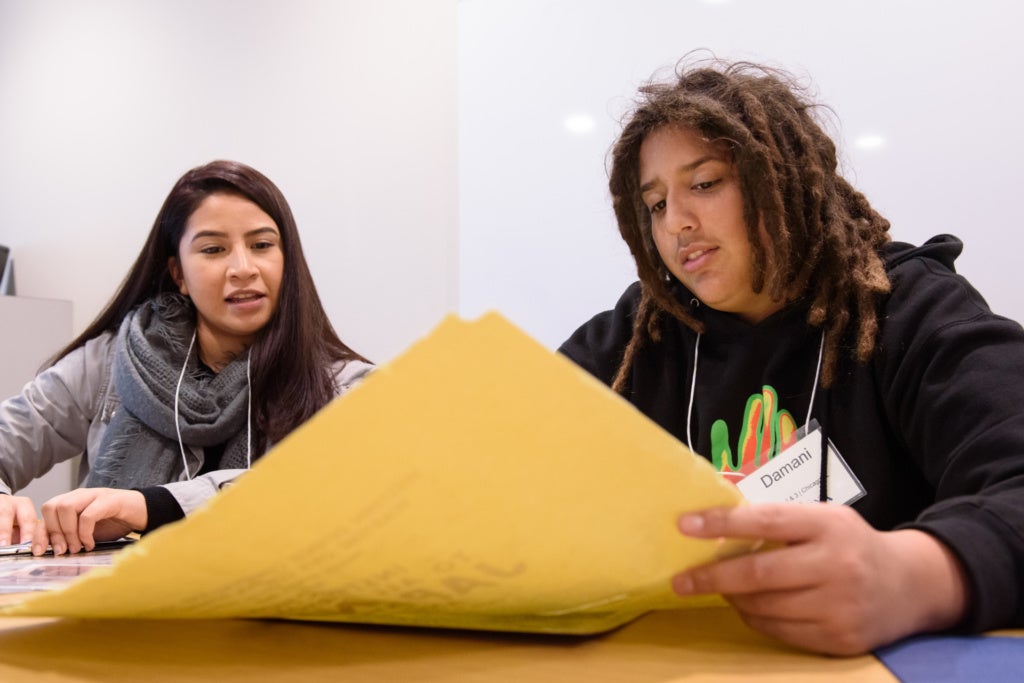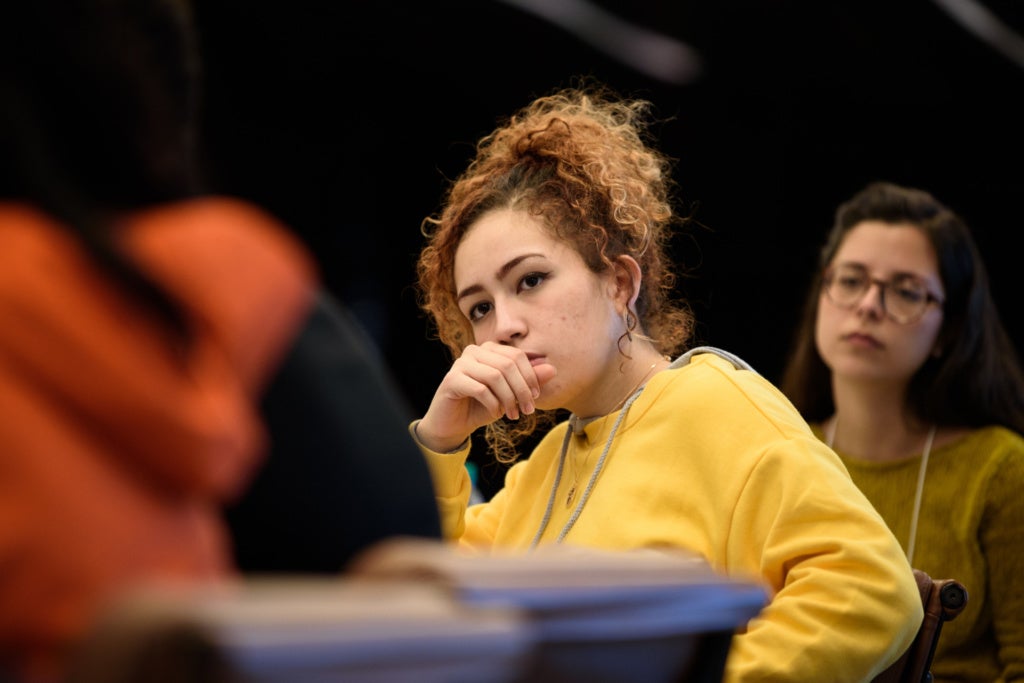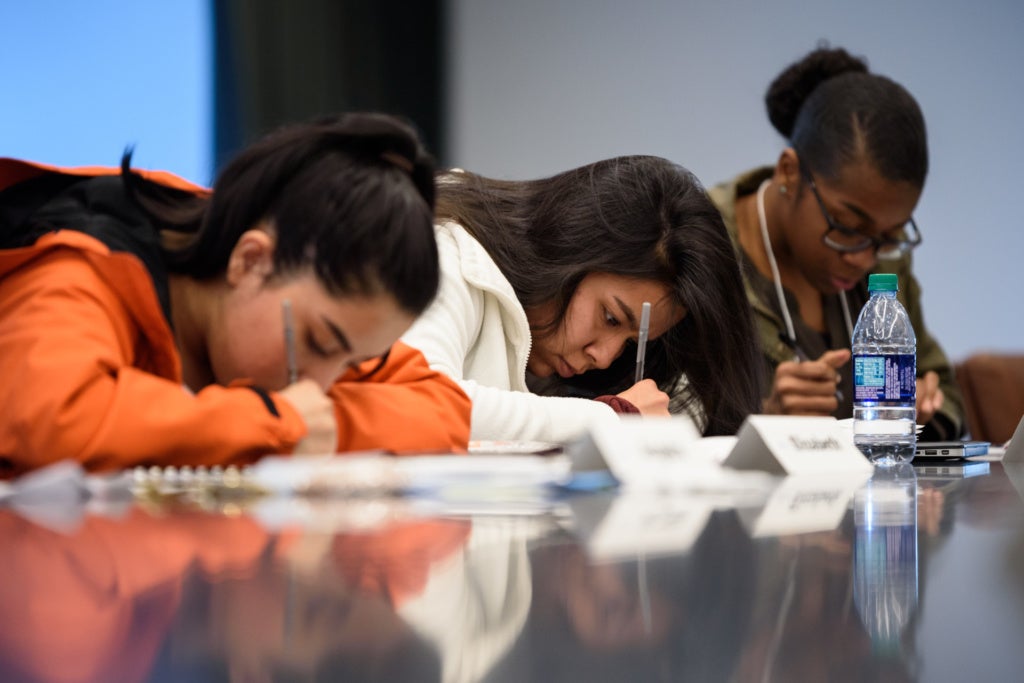This past weekend, AspenX partnered with The Academy Group, a non-profit dedicated to realizing the true potential of young people, to bring together students from across Chicago to learn about and discuss race, and begin to develop their ideas on how to create a more equitable future. From immigration, to intersectionality, to the difference between inviting and welcoming others, students unpacked numerous issues relevant to themselves and their communities.
AspenX is a two-day program during which high school students take a deep dive into critical issues of the day through virtual and experiential learning coupled with expert-moderated, in-person dialogue.

Brisa Rivera and Damani Lozano. Photo by Michael Courier.
Students began the first day of the program with experiential learning at the Chicago History Museum, where museum educators Heidi Moisan and Megan Clark guided participants through the museum’s Facing Freedom in America exhibition. Through a guided conversation and object-based learning activity, participants explored the ever-changing and incomplete definition of freedom in America, and the ongoing fight to expand who has freedom and in what ways.
The discussion focused on four historical events – Japanese internment, the United Farm Workers’ grape boycott, land rights for Native tribes, and Chicago’s school boycott – each representing various ways in which freedom, or the loss thereof, has shaped our country’s narrative and the numerous communities that have fought for equity throughout history. University of Chicago Charter School: Woodlawn Campus senior John West highlighted Chicago’s role in each of these issues, and how pivotal Chicagoans have been in leading numerous movements for change. Touring the rest of the exhibit and learning about the struggles and triumphs of union organizers, civil war soldiers, slaves, and suffragettes left participants with a looming question that every changemaker must ask themselves: what are you willing to do?
After an afternoon of engagement, the group spent time digging deeper on the issue of race and equity through a pen pal activity. Before seminar, participants selected one reading or video from a pre-set list to write a reflection on and were matched with another participant who chose the same option. Over dinner, these “pen pals” discussed their reflections and shared their thoughts on the experiences and perspectives that they believe caused the convergences and divergences between their responses. Many students selected Childish Gambino’s “This is America,” and noted how the music video demonstrates the way many people singularly focus on black culture, and The Noble Academy senior Minerva Lopez noted the way many people ignore or even minimize the violence black communities face at the hands of police.

Cathy Munoz. Photo by Michael Courier.
The following day, students reconvened at the Hyatt Hotel Headquarters to build and reflect on the prior day’s learning as it applies their own identities, others’ perspectives and experiences, and how this informs their path forward. Founder & CEO of FirstGen Partners LLC and Pahara-Aspen Education Fellow Angela Cobb led the conversation to help the group uncover the numerous ways race influences their own lives, the lives of those around them, and their broader communities.
The first module began with watching a clip from Kimberle Crenshaw’s TED Talk “The Urgency of Intersectionality,” which introduces the term “intersectionality” and provided an avenue for students to explore the ways their many identities intersect to shape their lived experience. Walter Payton College Prep senior Suwebat Solebo reflected that “I can’t help anyone unless I know myself,” underlining the important role self-awareness and self-discovery play in social justice. Participants also discussed the intersectional identities implicated in issues like education and immigration, both of which are particularly important in Chicago.
Next, students discussed Elizabeth C. Leung’s “My Country ‘Tis Not of Thee,” which chronicles her never-ending journey to understand her identity as an Asian-American woman, navigating between feeling too Asian to be truly American, but too American to be accepted back in her native China. Students reflected on the ways they’ve been made to feel they had to assimilate into Eurocentric American culture by neglecting parts of their own culture or codeswitching. Connecting back to the previous day’s conversation, participants also discussed the complicated nature of American identity, given that our “sweet land of liberty” was stolen from indigenous tribes. They also grappled with the difficulty of finding a sense of identity and culture when, because of the transatlantic slave trade, you may not know who your ancestors are or what country they came from. John Hancock College Prep student Brisa Rivera reflected on the need to accept that self-discovery is a lifelong journey – there is no need to rush towards certainty.
Students then explored the many communities impacted by – and activists organizing against – gun violence and police brutality, including the students from Parkland, Chicago youth, and the Latinx community, as well as the discrepancies in how and whether they each receive public support and awareness. George Washington High School senior Cathy Munoz pointed out that, while many can relate to being in school, not everyone can relate to being a person of color and that white allies need to overcome this empathy gap. Many recognized that the issue of gun violence is deeply tied to issues of media representation. Walter Payton College Prep’s Damani Lozano noted that you shouldn’t have to look hard to find news of your people, and others agreed that, when communities of color are covered in the media, the stories are often negative.
To begin to think about next steps, students watched spoken-word poet Amal Kassir’s “At The Table.” Amal’s piece calls into question who we do and don’t give a seat at the table, exemplifies the impact that has on communities, and proposes that we flip the script by inviting our country’s leaders to sit at marginalized communities’ tables instead. Roberto Clemente Community Academy senior Reem Fakhoury had a particularly emotional reaction to the piece, noting that she does not have opportunities to see other Middle Eastern women like her use their voice like Amal does, and how powerful it was to watch her take the stage and speak out. The group identified the difference between being invited and being welcomed and recognized instances in which individuals or groups may achieve representation but are not heard, respected, or valued. It left many questioning the best ways to achieve social change, and how important the decision to sit or not sit at any given table is.
Creating their own decision-making table, students culminated their experience and discussion by brainstorming ways to use what they learned at AspenX to create solutions to racial inequities in their communities. They tackled minority misrepresentation in the media, the lack of opportunities for under-represented individuals, and the stigma against immigrants. Their solutions included creating a YouTube channel run by minority youth that would cover current events, educating communities on the negative impact on underrepresentation, and creating a renewed and more inclusive DACA. These solutions, and their individual and collective commitment to taking action, allude to the more equitable world these young leaders are creating – and the nearness of the better future many have been wishing for.

Elizabeth Benitez, Minerva Lopez, and Justice Wysinger. Photo by Michael Courier.
While the day’s discussion included many expressions of feeling hopeless and tired, it also demonstrated the power of community, support, and personal growth. If these are the hands that are shaping and will continue to shape Chicago, there is reason for hope.

